China Celebs
Three Reasons Why Lipstick King’s ‘Eyebrow Pencil Gate’ Has Blown Up
From beauty guru to betrayal: why one livestream moment is shaking China’s internet.
Published
2 years agoon
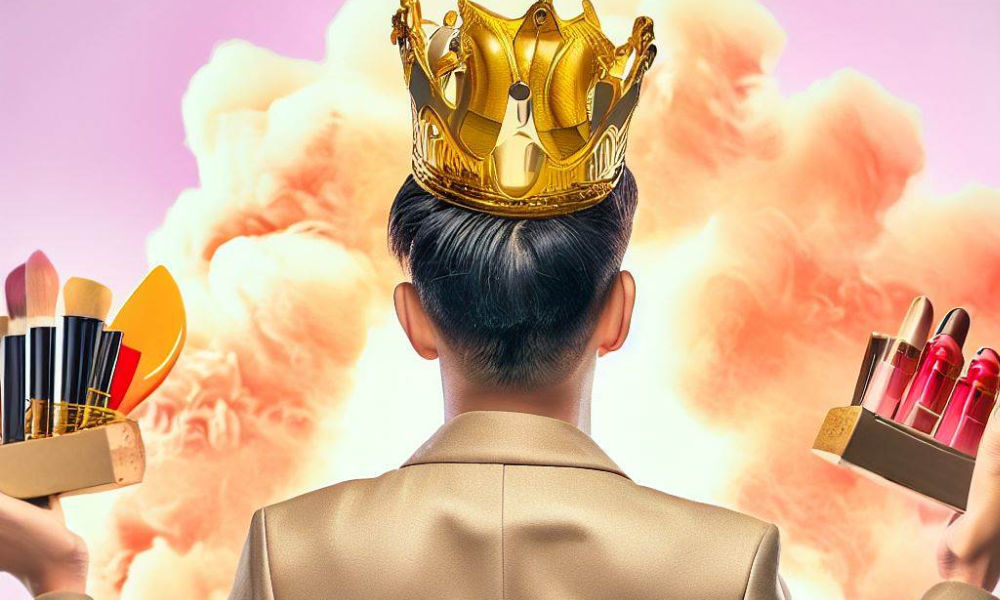
PREMIUM CONTENT
Li Jiaqi, also known as Austin Li the ‘Lipstick King,’ has become the focus of intense media attention in China over the past days.
The controversy began when the popular beauty influencer responded with apparent annoyance to a viewer’s comment about the high price of an eyebrow pencil. As a result, his fans began unfollowing him, netizens started scolding him, Chinese state criticized him, and the memes started flooding in.
Li Jiaqi’s tearful apology did not fix anything.
We reported about the incident here shortly after it went trending, and you can see the translated video of the moment here:
China's famous make-up influencer #LiJiaqi is in hot water due to an e-commerce livestream he did on Sunday. When viewers complained about an eyebrow pencil being too expensive (79 RMB/$10.9), he got annoyed, insisting that the product was not expensive at all. Translated video: pic.twitter.com/JDKGMKovDX
— Manya Koetse (@manyapan) September 11, 2023
The incident may seem minor at first glance. Li was merely promoting Florasis brand (花西子) eyebrow pencils, and some viewers expressed their opinion that the pencils, priced at 79 yuan ($11), had become more expensive.
In response, Li displayed irritation, questioning, “Expensive how?” He went on to suggest that viewers should also reflect on their own efforts and whether they were working hard enough to get a salary increase.
But there is more to this incident than just an $11 pencil and an unsympathetic response.
#1 The King Who Forgot the People Who Crowned Him
The initial reaction of netizens to Li Jiaqi’s remarks during the September 10th livestream was characterized by a strong sense of anger and disappointment.
Although celebrities often face scrutiny when displaying signs of arrogance after their rise to fame, the position of Li Jiaqi in the wanghong (internet celebrity) scene has been especially unique. He initially worked as a beauty consultant for L’Oreal within a shopping mall before embarking on his livestreaming career through Alibaba’s Taobao platform.
In a time when consumers have access to thousands of makeup products across various price ranges, Li Jiaqi established himself as a trusted cosmetics expert. People relied on his expertise to recommend the right products at the right prices, and his practice of personally applying and showcasing various lipstick colors made him all the more popular. He soon garnered millions of online fans who started calling him the Lipstick King.
By 2018, he had already amassed a significant fortune of 10 million yuan ($1.53 million). Fast forward three years, and his wealth had ballooned to an astonishing 18.5 billion yuan ($2.5 billion).
Despite his growing wealth, Li continued to enjoy the support of his fans, who appreciated his honest assessments of products during live testing sessions. He was known for candidly informing viewers when a product wasn’t worth buying, and the story of his humble beginnings as a shop assistant played a major role in why people trusted him and wanted him to succeed.
However, his recent change in tone, where he no longer seemed considerate of viewers who might find an $11 brow pencil to be expensive, suggests that he may have lost touch with his own customer base. Some individuals perceive this shift as a form of actual “betrayal” (背叛), as if a close friend has turned their back on them.

The viral cartoon shows Li Jiaqi going from a friendly beggar to angry rat.
One cartoon shared on social media shows Li Jiaqi, with mouse ears, as he initially begs his online viewers for money. However, as he becomes more prosperous, the cartoon portrays him gradually growing arrogant and eventually scolding those who helped him rise to fame.
Many people accuse Li of being insincere, suggesting that he revealed his true colors during that short livestream moment. This is also one of the reasons why most commenters say they do not believe his tears during his apology video.
“He betrayed China’s working class,” one popular vlog suggested.
#2 Internet Celebrity Crossing the Lines
Another reason why the incident involving Li Jiaqi is causing such a storm is related to the media context in which Chinese (internet) celebrities operate and what is expected of them.
Whether you are an actor, singer, comedian, or a famous livestreamer/e-commerce influencer, Chinese celebrities and performers are seen as fulfilling an exemplary role in society, serving the people and the nation (Jeffrey & Xu 2023). This is why, as explained in the 2019 research report by Jonathan Sullivan and Séagh Kehoe, moral components play such a significant role in Chinese celebrity culture.
In today’s age of social media, the role of celebrities in society has evolved to become even more significant as they have a vast reach and profound influence that extends to countless people and industries.
Their powerful influence makes celebrities important tools for authorities to convey messages that align with their goals – and definitely not contradict them. Through the media and cultural industries, the state can exert a certain level of control within the symbolic economy in which celebrities operate, as discussed by Sullivan and Kehoe in their 2019 work (p. 242).
This control over celebrities’ actions became particularly evident in the case of Li Jiaqi in 2022, following the ‘cake tank incident’ (坦克蛋糕事件). This incident unfolded during one of his livestreams when Li Jiaqi and his co-host introduced a chocolate cake in the shape of a tank, with an assistant in the back mentioning something about the sound of shooting coming from a tank (“坦克突突”). This livestream took place on June 3rd, on the night before the 33rd anniversary of the crackdown on the Tiananmen protests.
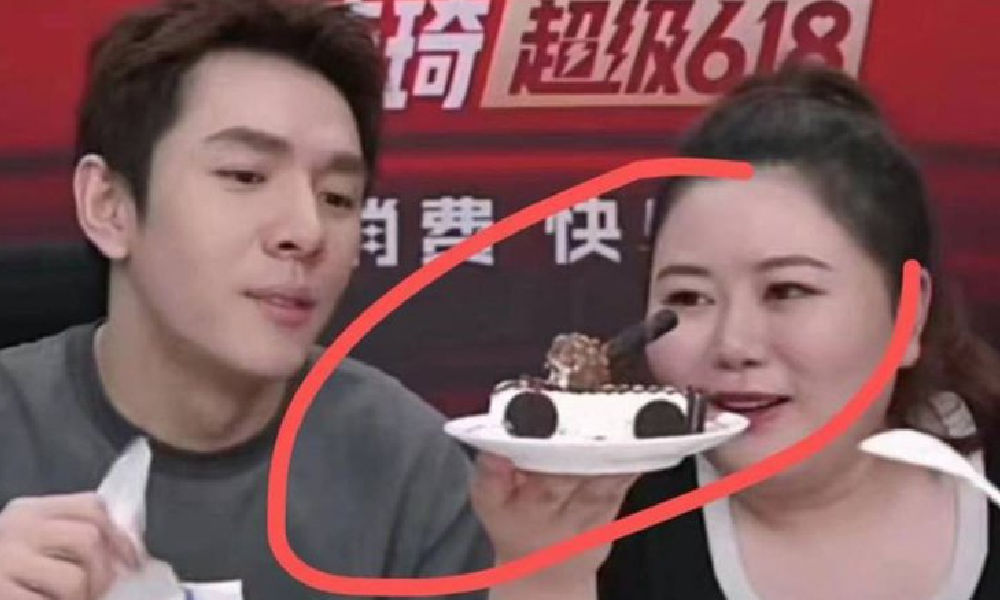
While Li Jiaqi did not directly touch upon a politically sensitive issue with his controversial livestream, his actions were perceived as a disregard for customer loyalty and displayed an arrogance inconsistent with socialist core values. This behavior garnered criticism in a recent post by the state media outlet CCTV.
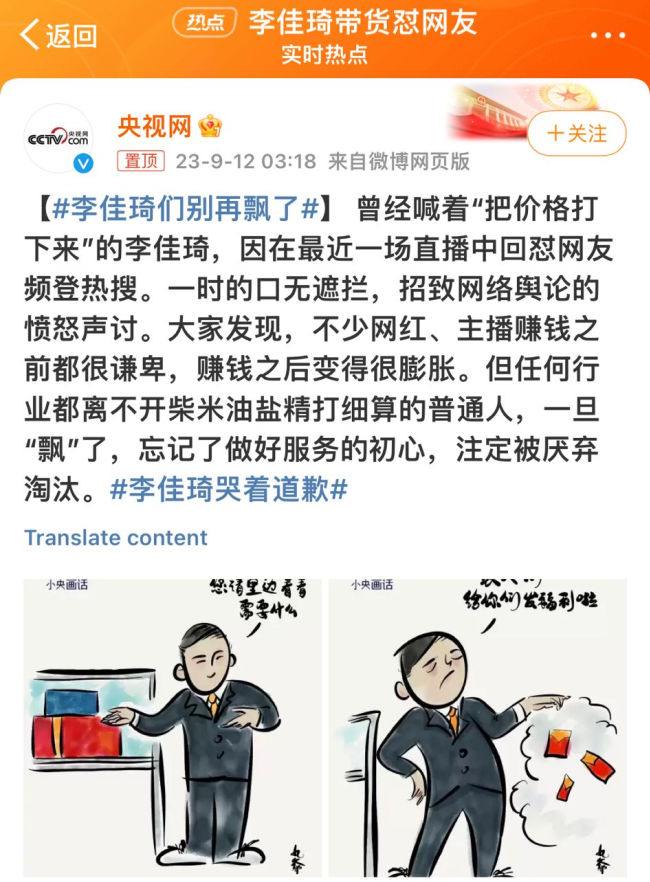
Post by CCTV condemning Li’s behavior.
Other state media outlets and official channels have joined in responding to the issue, amplifying the narrative of a conflict between the ‘common people’ and the ‘arrogant influencer.’
#3 Striking a Wrong Chord in Challenging Times
Lastly, Li Jiaqi’s controversial livestream moment also became especially big due to the specific words he said about people needing to reflect on their own work efforts if they cannot afford a $11 eyebrow pencil.
Various online discussions and some media, including CNN, are tying the backlash to young unemployment, tepid consumer spending, and the ongoing economic challenges faced by workers in China.
Since recent years, the term nèijuǎn (‘involution’, 内卷) has gained prominence when discussing the frustrations experienced by many young people in China. It serves as a concept to explain the social dynamics of China’s growing middle class who often find themselves stuck in a “rat race”; a highly competitive education and work environment, where everyone is continually intensifying their efforts to outperform one another, leading to this catch 22 situation where everyone appears to be caught in an unending cycle of exertion without substantial progress (read more here).
Weibo commenters note that, given China’s current employment situation and wage levels, hard work is not necessarily awarded with higher income. This context makes Li Jiaqi’s comments seem even more unnecessary and disconnected from the realities faced by his customers. One Shanghai surgeon responded to Li’s comments, saying that the fact that his salary has not increased over the last few year certainly is not because he is not working hard enough (#上海胸外科医生回应李佳琦言论#).
Some observers also recognize that Li, as an e-commerce professional, is, in a way, trapped in the same cycle of “inversion” where brands are continuously driving prices down to such low levels that consumers perceive it as the new normal. However, this pricing strategy may not be sustainable in the long run. (Ironically, some brands currently profiting from the controversy by promoting their own 79 yuan deals, suggesting their deal is much better than Li’s. Among them is the domestic brand Bee & Flower 蜂花, which is offering special skin care products sets for 79 yuan in light of the controversy.)
Many discussions therefore also revolve around the question of whether 79 yuan or $11 can be considered expensive for an eyebrow pencil, and opinions are divided. Some argue that people pay much more for skincare products, while others point out that if you were to weigh the actual quantity of pencil color, its price would surpass that of gold.
The incident has sparked discussions about the significance of 79 yuan in today’s times, under the hashtag “What is 79 yuan to normal people” (#79元对于普通人来说意味着什么#).
People have shared their perspectives, highlighting what this amount means in their daily lives. For some, it represents an entire day’s worth of home-cooked meals for a family. It exceeds the daily wages of certain workers, like street cleaners. Others equate it to the cost of 15 office lunches.

One netizen posts 79 yuan ($10.9) worth of groceries.
Amid all these discussions, it also becomes clear that many people are trying to live a frugal live in a time when their wages are not increasing, and that Li’s comments are just one reason to vent their frustrations about the situation they are in, In those regards, Li’s remarks really come at a wrong time, especially coming from a billionaire.
Will Li be able to continue his career after this?
Some are suggesting that it is time for Li to take some rest, speculating that Li’s behavior might stem from burn-out and mental issues. Others think that Li’s hardcore fans will remain loyal to their e-commerce idol.
For now, Li Jiaqi must tread carefully. He has already lost 1.3 million followers on his Weibo account. What’s even more challenging than regaining those one million followers is rebuilding the trust of his viewers.
Update: On September 19, the Florasis/Huaxizi brand finally apologized for its late response to the controversy, and the brand stated that the controversy provided an opportunity for them to listen to “the voice of their consumers.” Their decision to release a statement seemed fruitful: they gained 20,000 new followers in a night.
By Manya Koetse
with contributions by Miranda Barnes
Jeffreys, Elaine, and Jian Xu. 2023. “Governing China’s Celebrities.” Australian Institute of International Affairs, 18 May https://www.internationalaffairs.org.au/australianoutlook/governing-chinas-celebrities/ [12 Sep 2023].
Sullivan, Jonathan, and Séagh Kehoe. 2019. “Truth, Good and Beauty: The Politics of Celebrity in China.” The China Quarterly 237 (March): 241–256.
Spotted a mistake or want to add something? Please let us know in comments below or email us. First-time commenters, please be patient – we will have to manually approve your comment before it appears.
©2023 Whatsonweibo. All rights reserved. Do not reproduce our content without permission – you can contact us at info@whatsonweibo.com.
Manya is the founder and editor-in-chief of What's on Weibo, offering independent analysis of social trends, online media, and digital culture in China for over a decade. Subscribe to gain access to content, including the Weibo Watch newsletter, which provides deeper insights into the China trends that matter. More about Manya at manyakoetse.com or follow on X.

You may like
China Celebs
Explaining China’s Collective Grief Over the Death of ‘Big S’ Barbie Hsu
Published
1 month agoon
February 11, 2025
FROM THE WEIBO WATCH PREMIUM NEWSLETTER
The death of Barbie Hsu (徐熙媛) has sent shockwaves across Chinese social media. Her unexpected passing, along with the circumstances surrounding it, quickly became the most talked-about topic on Chinese social media in early February.
Barbie Hsu (1976) is generally known as “Big S” (大S) in China. The Taiwanese actress, singer, and TV host is one of those people who just always seemed to be around. She wasn’t just frequently a trending topic on Chinese social media but was also a household name, together with her sister, in the world of China’s pop culture and entertainment.
Most people will know Hsu because of the famous 2001 Taiwanese series Meteor Garden (流星花园), in which she played the award-winning role of female protagonist Shan Cai (杉菜). That role also made her famous outside of China, as the series became popular in South Korea, Singapore, the Philippines, Malaysia, and beyond.
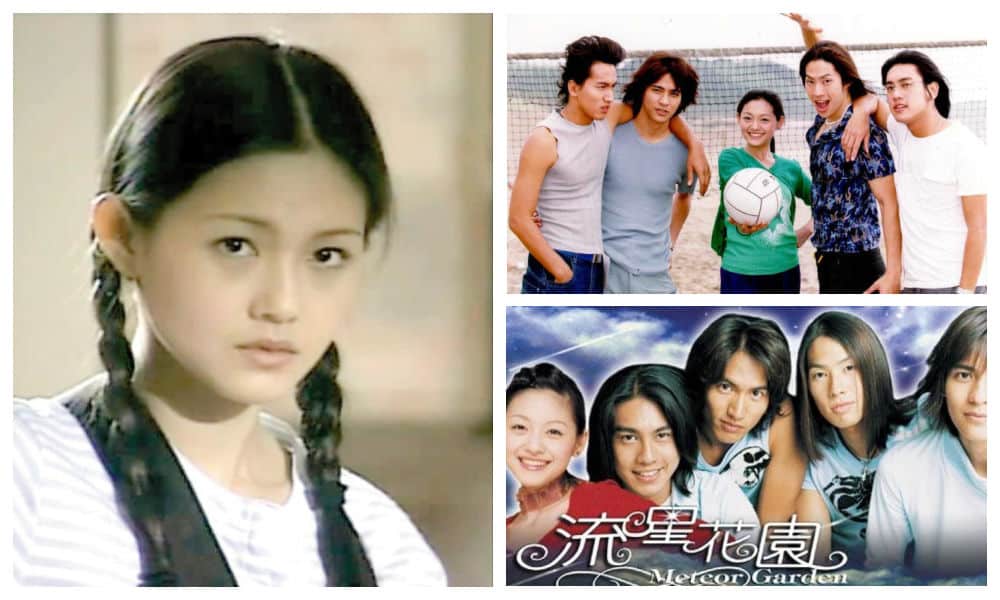
But her career had taken off years before that success. Together with her sister Dee Hsu (徐熙娣, “Little S” 小S), she formed the pop duo SOS (later “ASOS”) in the 1990s. The name stood for Sisters Of Shu (alternative spelling of Hsu), and was the source of their “Big S” and “Little S” nicknames.
She later made a switch to movies and was a TV host and a singer. While her sister Dee Shu gained recognition as the humorous host of the long-running talk show Kangxi Coming (康熙來了), Barbie Hsu also served as a stand-in host or guest on that show, as well as many others.
Besides her professional life, it was often Hsu’s private life that brought her to the top of Weibo’s trending charts. Her marriage to mainland Chinese businessman Wang Xiaofei (汪小菲)—with whom she had a daughter and a son in 2014 and 2016—frequently made headlines. The couple even participated in a reality show, and Hsu’s private life began to take on Kardashian-like proportions. The two were rumored to bicker over money issues after Wang opened S Hotel, a boutique hotel in Taipei designed by Philippe Starck and named after his wife.
Following their separation in 2021, much of the messy divorce drama between the two played out on Weibo and became the biggest celebrity topic of 2022. The ongoing drama started when Hsu accused her ex-husband of failing to pay alimony, with the accumulated amount allegedly exceeding NT$5 million (US$160,000). Wang Xiaofei then publicly and angrily responded to Hsu’s accusations with multiple emotional posts on his Weibo account, where he had over seven million followers. Everyone and everything got dragged into the drama, from Wang’s mother Zhang Lan (张兰) to Hsu’s new partner, South Korean musician DJ Koo Jun-Yup.
Hsu’s health and frail body also made headlines at times. In 2018, she was hospitalized after a epileptic fit brought on by a cold. Besides epilepsy, Hsu suffered from a chronic heart condition (mitral valve prolapse). In late January of this year, she traveled to Japan for the Chinese New Year and caught influenza during her trip. Her health deteriorated rapidly within just five days, and she passed away on February 2nd from influenza-induced pneumonia. She was only 48 years old.
The news of her death has had a massive impact on Chinese social media. On Weibo, the hashtag ‘Big S has Passed Away’ (#大S去世#) has garnered over 3.3 billion views within six days.
While the initial reaction was one of shock over her sudden passing, various other aspects of her life, legacy, and the circumstances surrounding her death have sparked broader discussions, turning it into a widely debated topic—one that many find particularly heartbreaking for various reasons.
➡️ As Barbie Hsu has been in the public eye for decades, many grew up watching her and following her for over 25 years. Even those who were not particularly fans of Hsu are now coming forward to express collective grief and nostalgia over her passing—like losing a piece of their younger self.
Similarly, the passing of the beloved pop star Coco Lee in 2023 also made people collectively reflect on a bygone era of Chinese pop culture that defined the youth of millions. Like Lee, Barbie Hsu was a big part of early 2000s Chinese pop culture. Some people admit that Hsu’s passing has left them crying for days.
Many netizens expressed grief not just for her death but also for the fading of a time when Taiwanese idol dramas and their own carefree youth were at their peak.
“I was in fifth grade when Meteor Garden aired, and I remember running home after school to watch it. I saved up 60 kuai ($8.6) to buy the DVD,” one Weibo user shared. “Such a lively and bold woman has suddenly disappeared, an entire generation’s youth and memories,” another person wrote.
➡️ The death of Barbie Hsu and the sudden, rapid progression of her illness—from influenza to fatal pneumonia—has raised awareness this week about the potential dangers of the flu. It has also triggered some public anxiety about the latest outbreak in Japan, which is experiencing its largest flu surge in 25 years, and how influenza is treated in the country.
Many are questioning why such a wealthy, well-known celebrity couldn’t receive effective treatment in Japan, a country generally perceived to have an advanced healthcare system. While it remains unclear how her condition deteriorated so quickly—especially since she allegedly appeared well and energetic at a January 25 banquet—it may not have helped that Hsu was in Hakone, an area without major hospitals like those in Kyoto or Tokyo. According to various media reports, Hsu sought medical assistance in the days leading up to her death but was not admitted to any hospital during that time.
In light of this incident, others also share their struggles with healthcare in Japan, claiming that costs and language barriers previously prevented them from receiving proper care while traveling there and falling ill.
➡️ Perhaps the strongest online response to Barbie Hsu’s death is related to gender dynamics, touching on topics such as feminism, misogyny, and patriarchy.
Many netizens argue that, despite always sacrificing herself for others, Hsu did not receive the love and care she deserved. The aftermath of her divorce from Wang Xiaofei left permanent scars on the superstar. Throughout her long career, Hsu consistently supported her family and became a family pillar and breadwinner. While navigating the harsh environment of the entertainment industry, she pushed herself and her body to the limits. Despite her efforts, she was always judged for her looks and body weight, and was later bullied and humiliated by her ex-husband.
A recurring sentiment among commenters, especially on Xiaohongshu, is that women, both in public and private life, are often overburdened while receiving little in return. Many pointed out that if someone as beautiful and successful as “Big S” could suffer under the burden of caregiving and the toxicity of the men around her, what hope is there for ordinary women?
At the same time, Hsu is also praised as an example of self-empowerment for all she accomplished, and as a reminder that taking good care of yourself is more important than seeking the validation of others.
➡️ On Weibo, the people expressing their grief over Hsu’s passing are also reflecting on the fragility of life. Notably, Hsu’s WeChat tag at the time of her death read, “Death is inevitable” (“死亡是必然的”).
In a past interview, she said: “Death is not scary. What’s scary is not being able to die. Aging is not scary. What’s scary is living forever.” (“死不可怕。可怕的是死不了。老不可怕。可怕的是长生不老。”)
By Manya Koetse
(follow on X, LinkedIn, or Instagram)
Spotted a mistake or want to add something? Please let us know in comments below or email us. First-time commenters, please be patient – we will have to manually approve your comment before it appears.
©2025 Whatsonweibo. All rights reserved. Do not reproduce our content without permission – you can contact us at info@whatsonweibo.com.
China Arts & Entertainment
Controversial Wanghong Livestreamers Are Becoming a Weibo Staple in China
‘Wanghong’ was a mark of online fame; now, it’s increasingly tied to controversy and scandal.
Published
5 months agoon
October 27, 2024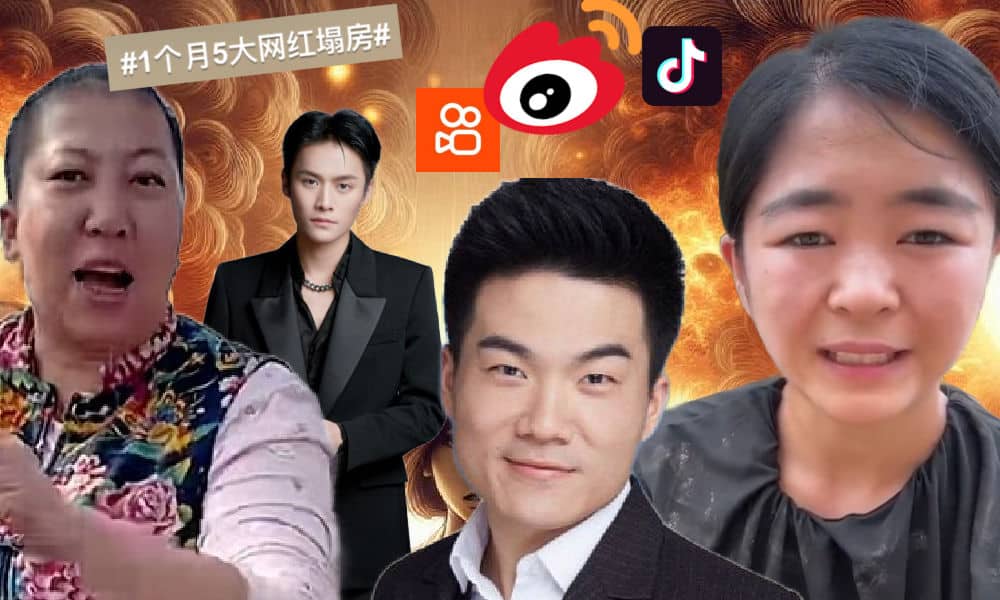
As livestreaming continues to gain popularity in China, so do the controversies surrounding the industry. Negative headlines involving high-profile livestreamers, as well as aspiring influencers hoping to make it big, frequently dominate Weibo’s trending topics.
These headlines usually revolve around China’s so-called wǎnghóng (网红) influencers. Wanghong is a shortened form of the phrase “internet celebrity” (wǎngluò hóngrén 网络红人). The term doesn’t just refer to internet personalities but also captures the viral nature of their influence—describing content or trends that gain rapid online attention and spread widely across social media.
Recently, an incident sparked debate over China’s wanghong livestreamers, focusing on Xiaohuxing (@小虎行), a streamer with around 60,000 followers on Douyin, who primarily posts evaluations of civil aviation services in China.

Xiaohuxing (@小虎行)
On October 15, 2024, at Shenzhen Bao’an International Airport, Xiaohuxing confronted a volunteer at the automated check-in counter, insisting she remove her mask while livestreaming the entire encounter. He was heard demanding, “What gives you the right to wear a mask? What gives you the right not to take it off?” and even attempted to forcibly remove her mask, challenging her to call the police.

During the livestream, the livestreamer confronted the woman on the right for wearing a facemask.
He also argued with a male traveler who tried to intervene. In the end, the airport’s security officers detained him. Shortly after the incident, a video of the livestream went viral on Weibo under various hashtags (e.g. #网红小虎行机场强迫志愿者摘口罩#) and attracted millions of views. The following day, Xiaohuxing’s Douyin account was banned, and all his videos were removed. The Shenzhen Public Security Bureau later announced that the account’s owner, identified as Wang, had been placed in administrative detention.
On October 13, just days before, another livestreaming controversy erupted at Guangzhou Baiyun International Airport. Malatang (@麻辣烫), a popular Douyin streamer with over a million followers, secretly filmed a young couple kissing and mocked them, continuing to film while passing through security—an area where filming is prohibited.
Her livestream quickly went viral, sparking discussions about unauthorized filming and misconduct among Chinese wanghong. In response, Malatang’s agent posted an apology video. However, the affected couple hired a lawyer and reported the incident to the police (#被百万粉丝网红偷拍当事人发声#). On October 17, Malatang’s Douyin account was banned, and her videos were removed.

Livestreamer Malatang making fun of the couple in the back at the airport.
In both cases, netizens uncovered additional examples of inappropriate behavior by Xiaohuxing and Malatang in past broadcasts. For example, Xiaohuxing was reportedly aggressive towards a flight attendant, demanding she kneel to serve him, while Malatang was criticized for scolding a delivery person who declined to interact with her on camera.
Comments on Weibo included, “They’ll do anything for traffic. Wanghong are getting a bad reputation because of people like this.” Another added, “It seems as if ‘wanghong’ has become a negative term now.”
Rising Scrutiny in China’s Wanghong Economy
Xiaohuxing and Malatang are far from isolated cases. Recently, many other wanghong livestreamers have also been caught up in negative news.
One such figure is Dong Yuhui (董宇辉), a former English teacher at New Oriental (新东方) who transitioned to livestreaming for East Buy (东方甄选), where he mixed education with e-commerce (read here). Dong gained significant popularity and boosted East Buy’s brand before leaving to start his own company. Recently, however, Dong faced backlash for inaccurate statements about Marie Curie during an October 9 livestream. He incorrectly claimed that Curie discovered uranium, invented the X-ray machine, and won the Nobel Prize in Literature, among other things.
Considering his public image as a knowledgeable “teacher” livestreamer, this incident sparked skepticism among viewers about his actual expertise. A related hashtag (#董宇辉称居里夫人获得诺贝尔文学奖#) garnered over 81 million views on Weibo. In addition to this criticism, Dong is also being questioned about potential false advertising, which is a major challenge for all livestreamers selling products during their streams.

Dong Yuhui (董宇辉) during one of his livestreams.
Another popular livestreamer, Dongbei Yujie (@东北雨姐), is currently also facing criticism over product quality and false advertising claims. Originally from Northeast China, Dongbei Yujie shares content focused on rural life in the region. Recently, her Douyin account, which boasts an impressive 22 million followers, was muted due to concerns over the quality of products she promoted, such as sweet potato noodles (which reportedly contained no sweet potato). Despite issuing public apologies—which have garnered over 160 million views under the hashtag “Dongbei Yujie Apologizes” (#东北雨姐道歉#)—the controversy has impacted her account and led to a penalty of 1.65 million yuan (approximately 231,900 USD).

From Dongbei Yujie’s apology video
Former top Douyin livestreamer Fengkuang Xiaoyangge (@疯狂小杨哥) is also facing a career downturn. Leading up to the 2024 Mid-Autumn Festival, he promoted Hong Kong Meicheng mooncakes in his livestreams, branding them as a high-end Hong Kong product. However, it was soon revealed that these mooncakes had no retail presence in Hong Kong and were primarily produced in Guangzhou and Foshan, sparking accusations of deceptive marketing. Due to this incident and previous cases of misleading advertising, his company came under investigation and was penalized. In just a few weeks, Fengkuang Xiaoyangge lost over 8.5 million followers (#小杨哥掉粉超850万#).

Fengkuang Xiaoyangge (@疯狂小杨哥) and the mooncake controversy.
It’s not only ecommerce livestreamers who are getting caught up in scandal. Recently, the influencer “Xiaoxiao Nuli Shenghuo” (@小小努力生活) and her mother were arrested for fabricating a tragic story – including abandonment, adoption, and hardships – to gain sympathy from over one million followers and earn money through donations and sales. They, and two others who helped them manage their account, were sentenced to ten days in prison for ‘false advertising.’
Wanghong Fame: Opportunity and Risk
China’s so-called ‘wanghong economy’ has surged in recent years, with countless content creators emerging across platforms like Douyin, Kuaishou, and Taobao Live. These platforms have transformed interactions between content creators and viewers and changed how products are marketed and sold.
For many aspiring influencers, becoming a livestreamer is the first step to building a presence in the streaming world. It serves as a gateway to attracting traffic and potentially monetizing their online influence.
However, before achieving widespread fame, some livestreamers resort to using outrageous or even offensive content to capture attention, even if it leads to criticism. For example, before his account was banned, Xiaohuxing set his comment section to allow only followers to comment, gaining 3,000 new followers after his controversial livestream at Shenzhen Airport went viral. Many speculated that some followers joined just to leave critical comments, but it nonetheless grew his following.
As livestreamers gain significant fame, they must exercise greater caution, as they often hold substantial influence over their audiences, making accuracy essential. Mistakes, whether intentional or not, can quickly erode trust, as seen in the example of the super popular Dong Yuhui, who faced backlash after his inaccurate comment about Marie Curie sparked public criticism.
China’s top makeup livestreamer, Li Jiaqi (李佳琦), experienced a similar reputational crisis in September last year. Responding dismissively to a viewer who commented on the high price of an eyebrow pencil, Li replied, “Have you received a raise after all these years? Have you worked hard enough?” Commentators pointed out that the pencil’s cost per gram was double that of gold at the time. Accused of “forgetting his roots” as a former humble salesman, Li lost one million Weibo followers in a day (read more here).
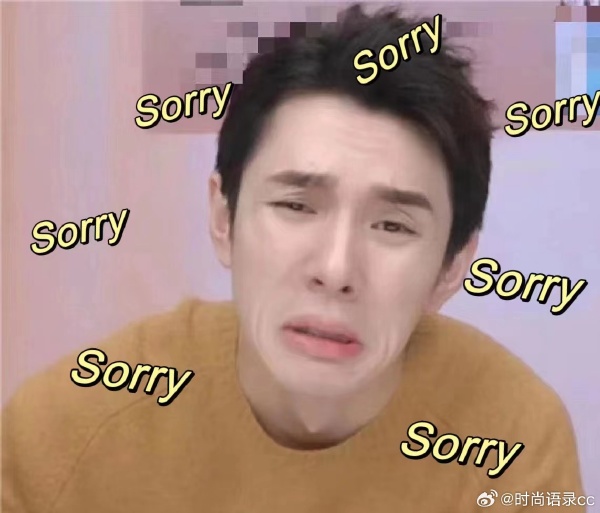
This meme shows that many viewers did not feel moved by Li’s apologetic tears after the eyepencil incident.
Despite the challenges and risks, becoming a wanghong remains an attractive career path for many. A mid-2023 Weibo survey on “Contemporary Employment Trends” showed that 61.6% of nearly 10,000 recent graduates were open to emerging professions like livestreaming, while 38.4% preferred more traditional career paths.
Taming the Wanghong Economy
In response to the increasing number of controversies and scandals brought by some wanghong livestreamers, Chinese authorities are implementing stricter regulations to monitor the livestreaming industry.
In 2021, China’s Propaganda Department and other authorities began emphasizing the societal influence of online influencers as role models. That year, the China Association of Performing Arts introduced the “Management Measures for the Warning and Return of Online Hosts” (网络主播警示与复出管理办法), which makes it challenging, if not impossible, for “canceled” celebrities to stage a comeback as livestreamers (read more).
The Regulation on the Implementation of the Law of the People’s Republic of China on the Protection of Consumer Rights and Interests (中华人民共和国消费者权益保护法实施条例), effective July 1, 2024, imposes stricter rules on livestream sales. It requires livestreams to disclose both the promoter and the product owner and mandates platforms to protect consumer rights. In cases of illegal activity, the platform, livestreaming room, and host are all held accountable. Violations may result in warnings, confiscation of illegal earnings, fines, business suspensions, or even the revocation of business licenses.
These regulations have created a more controlled “wanghong” economy, a marked shift from the earlier, more unregulated era of livestreaming. While some view these measures as restrictive, many commenters support the tighter oversight.
A well-known Kuaishou influencer, who collaborates with a person with dwarfism, recently faced backlash for sharing “vulgar content,” including videos where he kicks his collaborator (see video) or stages sensational scenes just for attention.
Most commenters welcome the recent wave of criticism and actions taken against such influencers, including Xiaohuxing and Dongbei Yujie, for their behavior. “It’s easy to become famous and make money like this,” commenters noted, adding, “It’s good to see the industry getting cleaned up.”
State media outlet People’s Daily echoed this sentiment in an October 21 commentary, stating, “No matter how many fans you have or how high your traffic is, legal lines must not be crossed. Those who cross the red line will ultimately pay the price.”
This article and recent incidents have sparked more online discussions about the kind of influencers needed in the livestreaming era. Many suggest that, beyond adhering to legal boundaries, celebrity livestreamers should demonstrate a higher moral standard and responsibility within this digital landscape. “We need positive energy, we need people who are authentic,” one Weibo user wrote.
Others, however, believe misbehaving “wanghong” livestreamers naturally face consequences: “They rise fast, but their popularity fades just as quickly.”
When asked, “What kind of influencers do we need?” one commenter responded, “We don’t need influencers at all.”
By Wendy Huang
Follow @whatsonweibo
Edited for clarity by Manya Koetse
Spotted a mistake or want to add something? Please let us know in comments below or email us. Please note that your comment below will need to be manually approved if you’re a first-time poster here.
©2024 Whatsonweibo. All rights reserved. Do not reproduce our content without permission – you can contact us at info@whatsonweibo.com
Subscribe

How K-pop Fans and the 13-Year-Old Daughter of Baidu VP Sparked a Debate on Online Privacy

Squat or Sit? China’s Great Toilet Debate and the Problem of Footprints on the Seat

Weibo Watch: The Great Squat vs Sitting Toilet Debate in China🧻

Chinese Netizens Turn to Tim Cook Over Battery Factory’s Illegal Overtime

Revisiting China’s Most Viral Resignation Letter: “The World Is So Big, I Want to Go and See It”

Our Picks: Top 10 Chinese Buzzwords and Phrases of 2024 Explained

“Dear Li Hua”: The TikTok/Xiaohongshu Honeymoon Explained

Beyond the Box Office: What’s Behind Ne Zha 2’s Success?

Weibo Watch: Christmas in China Is Everywhere and Nowhere

Weibo Watch: A New Chapter

12-Year-Old Girl from Shandong Gets Infected with HPV: Viral Case Exposes Failures in Protecting Minors

15 Years of Weibo: The Evolution of China’s Social Media Giant

Tuning Into the Year of the Snake

The ‘China-chic Girl’ Image and the Realities of China’s Competitive Food Delivery Market

TikTok Refugees, Xiaohongshu, and the Letters from Li Hua
Get in touch
Would you like to become a contributor, or do you have any tips or suggestions? Get in touch here!
Popular Reads
-

 China Insight11 months ago
China Insight11 months agoThe Tragic Story of “Fat Cat”: How a Chinese Gamer’s Suicide Went Viral
-

 China Music12 months ago
China Music12 months agoThe Chinese Viral TikTok Song Explained (No, It’s Not About Samsung)
-

 China Digital10 months ago
China Digital10 months agoChina’s 2024 Gaokao Triggers Online Discussions on AI
-

 China Arts & Entertainment10 months ago
China Arts & Entertainment10 months agoSinging Competition or Patriotic Fight? Hunan TV’s ‘Singer 2024’ Stirs Nationalistic Sentiments




